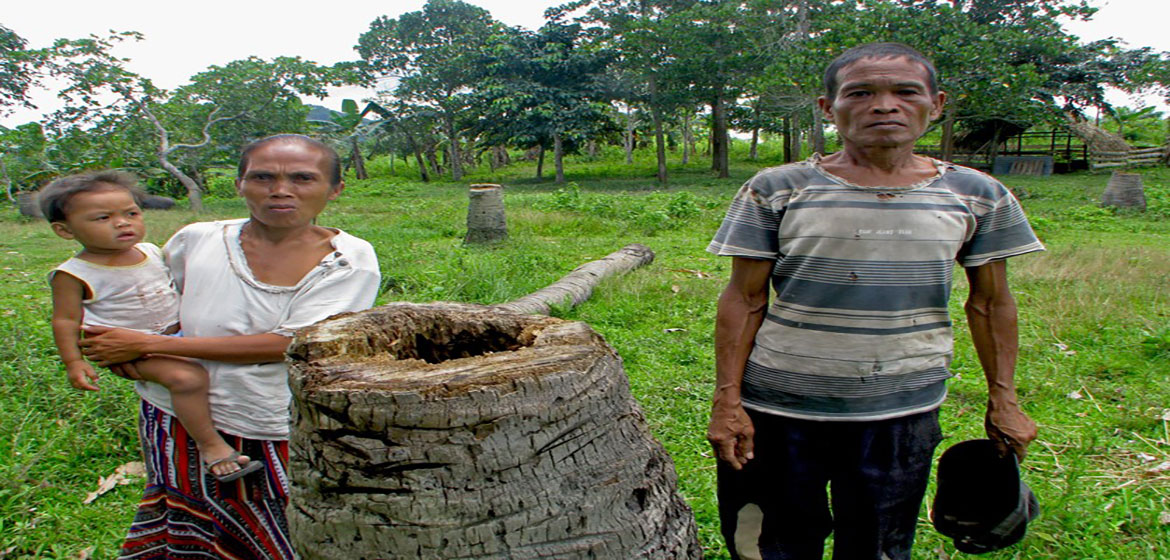In the province of Palawan, indigenous communities and civil society have denounced illegal clearing of pristine forests and indigenous rights violations by oil palm companies.
Palawan, the Philippines’ westernmost province and known as the country’s last ecological frontier, is a UNESCO , which requires the province to promote a mix of conservation and sustainable development in dialogue with local communities. However, indigenous leaders and activists who have spoken with IDM tell a story that is far from this ideal.
In its latest , the Coalition Against Land Grabbing (CALG), a local collective of indigenous peoples affiliated with the Global ICCA Consortium, said that oil palm companies have violated environmental, health and safety laws and regulations, as well as indigenous peoples’ rights. “Oil palm is destroying Palawan’s forests, encroaching on ancestral domains and, increasingly, threatening the indigenous peoples’ food security,” the NGO said.
Oil palm companies in the province include Palawan Palm & Vegetable Oil Mills Inc (PPVOMI), a Singaporean-Pilipino joint venture that sells all its production to its sister company Agumil Philippines Inc (AGPI). CALG told IDM that information it has obtained from industry sources reveals that kernel and crude palm oil are being shipped from Palawan to refineries in Sabah, Malaysia, and that 70 percent of the total production is exported to Singapore, China and Malaysia. This bluntly contrasts with the government’s initial commitment to produce healthy and cheap palm oil for local consumption.
CALG accuses the company of encroaching on ancestral lands without the free, prior and informed consent of affected communities and in violation of the Philippines’ Indigenous Peoples’ Rights Act (IPRA Law). According to the organisation, oil palm companies have inexplicably been able to bypass provincial licensing requirements. CALG also points out that ‘Environmental Compliance Certificates’ – which do not authorise forest clearing – have been issued by the Department of Environment and Natural Resources (DENR) to Agumil and PPVOMI without sufficient evidence that environmental standards would be met.
It is estimated that over 9,000 hectares of land in southern Palawan have already been into plantations.
In addition to the illegal clear-cutting of virgin forests, CALG has loss of biodiversity, genetic erosion of traditional crops, increasing malnutrition, low employment rates and exploitative working conditions at plantations. This contrasts with the prosperity promised by the companies and local authorities.
“Agumil told us that 70 percent of the benefits from the oil palm production would be given to us and only 30 percent to them. In less than one year, they said, we would have made enough profit to buy our own four-wheel drives,” says a CALG member.
Dario Novellino, an anthropologist at the University of Kent’s Centre for Biocultural Diversity who has documented the ecological collapse and social unrest taking place in Palawan told IDM: “In the process of land conversion, natural resources on which traditional communities depend for their lives are completely washed away. Livelihood and cultural transmission are now irremediably affected.”
Kenisio Malasan, a traditional Pala’wan leader, speaks passionately of the importance of medicinal plants and their disappearance. “Because of oil palm plantations, it is like we are dying little by little as we no longer have those plants to cure ourselves,” he told IDM. “Before we only walked a few steps away from our homes to get the raw material for making artifacts and preparing herbal medicines. Now we have to walk half a day before we can find these.”
The official government line is that oil palms are only planted on ‘idle’ and ‘abandoned’ land to enhance land rehabilitation and boost rural economy. According to Novellino, however, “so-called ‘idle’ and ‘unproductive’ lands include that have sustained indigenous peoples since time immemorial.”

Agumil oil palm plantations in the Municipality of Española, Palawan. Image courtesy of Dario Novellino.
Local communities also worry that land being converted into oil palm plantations is likely to be rendered infertile through the continuous use of chemical fertilisers. “After companies leave, it will be nearly impossible for indigenous peoples and poor farmers to revert such lands into cultivated fields,” Novellino says.
CALG has also drawn attention to the increasing violence and harassment to which indigenous leaders and other environmental activists have been subjected. In 2018 the organisation 25 killings of environmental human rights defenders in the country, the deadliest in southeast Asia. Activists in Palawan have death threats.
In rare victories, CALG has in influencing the municipalities of Rizal and Quezon to pass their own resolutions against the further expansion of oil palm plantations. However, CALG and Rainforest Rescue have for a province-wide moratorium on oil palm expansion as the only way to prevent further damage to forests and indigenous communities.
Source:
Related to SDG 10: Reduced inequalities and SDG 15: Life on land



